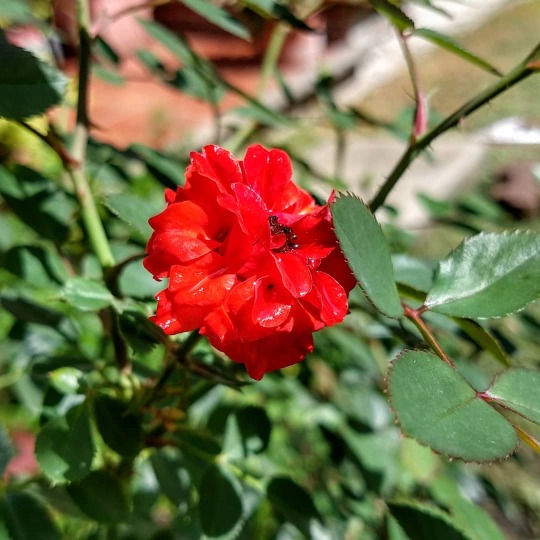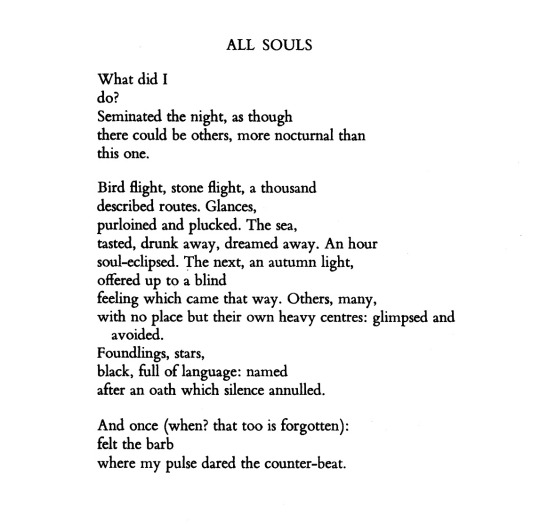#die niemandsrose
Explore tagged Tumblr posts
Text
Paul Celan – The word of going down deep
The word of going down deep that we have read. The years, the words since then. We still are who we are. You know space is infinite, you know there is no need to fly, you know: what wrote itself into your eye deepens us into depth. – Paul Celan From Die Niemandsrose (1963). Translated by Johannes Beilharz (© 2023).

View On WordPress
92 notes
·
View notes
Text
youtube
Michael Nyman, Six Celan Songs (3. Psalm). Sobre el poema de Paul Celan en Die Niemandsrose. Versión dirigida por el propio compositor e interpretada por Ute Lemper.
Ein Nichts waren wir, sind wir, werden wir bleiben, blühend: die Nichts-, die Niemandsrose.
Volví a este ciclo de canciones. Nunca ha dejado de impresionarme cómo dieron sonido a libros tan complejos como Die Niemandsrose y Sprachgitter. Hasta la fecha también sigo admirada por las hazañas vocales de Ute Lemper en este ciclo.
6 notes
·
View notes
Text
You know space is infinite, you know there is no need to fly, you know: what wrote itself into your eye deepens us into depth. – Paul Celan From Die Niemandsrose (1963). Translated by Johannes Beilharz (© 2023).
youtube
#space#infinite#fly#deep#depth#paul celan#johannes beilharz#dark#electronic#ambient#shift#stake#calim#claim#seperate#one
1 note
·
View note
Text
Erratisch
Die Abende graben sich dir
unters Aug. Mit der Lippe auf-
gesammelte Silben - schönes,
lautloses Rund -
helfen dem Kriechstern
in ihrer Mitte. Der Stein,
schläfennah einst, tut sich hier auf:
bei allen
versprengten
Sonnen, Seele,
warst du, im Äther.
- Paul Celan
#gedicht#poem#paul celan#poetry#lyrik#deutsch#german#deutsche lyrik#die niemandsrose#jewish authors#ingeborg bachmann#erratisch
3 notes
·
View notes
Photo


Hélène Cixous, ‘The History of a Letter’ Poetry, Passion, and History: Marina Tsvetayeva (tr. Verena Andermatt Conley)
#Hélène Cixous#Poetry Passion and History: Marina Tsvetayeva#Verena Andermatt Conley#Marina Tsvetayeva#nonfiction#essays#prose#m#The History of a Letter#Osip Mandelstam#Die Niemandsrose#Paul Celan#Boris Pasternak#Russia#Und mit dem Buch aus Tarussa#Poem of the End#Judaism#exile
1 note
·
View note
Quote
IL Y AVAIT DE LA TERRE EN EUX, et ils creusaient. Ils creusaient, creusaient, ainsi passa leur jour, leur nuit. Il ne louaient pas Dieu qui - entendaient-ils - voulait tout ça, qui - entendaient-ils - savait tout ça. Ils creusaient, et n'entendaient plus rien ; ils ne devinrent pas sages, n'inventèrent pas de chanson, n'imaginèrent aucune sorte de langue. Ils creusaient. Il vint un calme, il vint aussi une tempête, vinrent toutes les mers. Je creuse, tu creuses, il creuse aussi le ver, et ce qui chante là-bas dit : ils creusent. Ô un, ô nul, ô personne, ô toi : où ça menait, si vers nulle-part ? Ô tu creuses et je creuse, je me creuse jusqu'à toi - à notre doigt l'anneau s'éveille.
Paul Celan, in Die Niemandsrose / La rose de personne, trad. Martine Broda
14 notes
·
View notes
Quote
YOUR BEING beyond in the night.
Paul Celan, excerpt of Your Being Beyond (tr. by Michael Hamburger)
Original—DEIN HINÜBERSEIN heute Nacht.
87 notes
·
View notes
Photo

"Ya nadie nos moldea con tierra y con arcilla, ya nadie con su hálito despierta nuestro polvo. Nadie. Alabado seas, Nadie. Queremos por tu amor florecer contra ti. Una nada fuimos, somos, seremos, floreciendo: rosa de nada, de nadie. Con el pistilo almalúcido, cielo desierto el estambre, la corola roja de la palabra purpúrea que cantamos sobre, o sobre la espina." Paul Celan - Salmo ---------------------------------------------------- "Niemand knetet uns wieder aus Erde und Lehm, niemand bespricht unseren Staub. Niemand. Gelobt seist du, Niemand. Dir zulieb wollen wir blühn. Dir entgegen. Ein Nichts waren wir, sind wir, werden wir bleiben, blühend: die Nichts-, die Niemandsrose. Mit dem Griffel seelenhell, dem Staubfaden himmelswüst, der Krone rot vom Purpurwort, das wir sangen über, o über dem Dorn." Paul Celan - Psalm #cuernavaca #rosal #paulcelan #psalm #salmo (en Morelos, Cuernavaca) https://www.instagram.com/p/CCEQbzIBYpq/?igshid=132ami5ly3zaj
4 notes
·
View notes
Text
Article originally published on poetryfoundation.org
PAUL CELAN
23rd November 1920–20th April 1970

Paul Celan was born Paul Antschel in Czernovitz, Romania, to a German-speaking Jewish family. His surname was later spelled Ancel, and he eventually adopted the anagram Celan as his pen name. In 1938 Celan went to Paris to study medicine, but returned to Romania before the outbreak of World War II. During the war Celan worked in a forced labor camp for 18 months; his parents were deported to a Nazi concentration camp. His father most likely died of typhus and his mother was shot after being unable to work. After escaping the labor camp, Celan lived in Bucharest and Vienna before settling in Paris. Celan was familiar with at least six languages, and fluent in Russian, French, and Romanian. In Paris, he taught German language and literature at L’École Normale Supérieure and earned a significant portion of his income as a translator, translating a wide range of work, from Robert Frost, Marianne Moore, and Emily Dickinson to Arthur Rimbaud, Antonin Artaud, and Charles Baudelaire. His own work has been translated into English numerous times and by several noted poets and translators including Michael Hamburger, Rosmarie Waldrop, Heather McHugh, John Felstiner, and Pierre Joris.
Though he lived in France and was influenced by the French surrealists, he wrote his own poetry in German. His first collection of poems, Sand from the Urns, was published in Vienna in 1948; his second collection, Poppy and Memory (Mohn und Gedaechtnis, 1952), brought him critical acclaim. Katherine Washburn, his translator, noted in her introduction to Last Poems (1986): “The title of this book [Poppy and Memory] pointed with a fine vividness to the central predicament of Celan’s poetry—the unstable and dangerous union between Paul Celan, caught early in that sensual music of the Surrealists, pure poet of the intoxicating line, and Paul Ancel, heir and hostage to the most lacerating of human memories.”
While Celan is perhaps best known for his poem “Death Fugue” (or “Todesfuge”), it is not necessarily representative of his later work. Reviewing the 1981 publication Paul Celan: Poems in the New York Times, Rika Lesser said the poem’s “richly sonic, dactylic lines (spoken by the inmates of a camp), while typical of Celan's mastery of form, content, texture and sound, are hardly indicative of the direction his composition would later take.” As his career continued, Celan worked to “purge his poems of readymade contexts - whether historical, traditional or explicitly religious. The late poems still abound in allusions - private, hermeneutic, esoteric - but increasingly each poem becomes and creates its own context and the context within which Celan's other poems must be read.”
This transformation has much to do with the language in which Celan wrote. As Shoshana Olidort notes in her Chicago Tribune review of Breathturn Into Timestead: Collected Later Poetry of Paul Celan (trans. by Pierre Joris and published by FSG, 2014), Celan was “a Holocaust survivor, [who] wrote in German, his mother tongue and also the language of his mother's murderers … As a German-speaking Jewish survivor living in France, Celan harbored feelings of intense estrangement from the language and thus set about creating his own language through what Joris eloquently describes as a “dismantling and rewelding” of German. The result, Olidort writes, “is arguably even darker than his earlier poems with their direct references to the Shoah. For Celan, darkness is not willed obscurity, rather, the poem comes out of lived experience and is "born dark.”
Celan received the Bremen Prize for German Literature in 1958 and the Georg Buchner Prize in 1960. He suffered from depression and committed suicide in 1970.

BIBLIOGRAPHY
Poetry Collections
The Sand from the Urns (Der Sand aus den Urnen, 1948).
Poppy and Memory (Mohn und Gedächtnis, 1952).
From Threshold to Threshold (Von Schwelle zu Schwelle, 1955).
Speechwicket / Speech Grille (Sprachgitter, 1959).
The No-One's-Rose (Die Niemandsrose, 1963).
Breathturn (Atemwende, 1967).
Threadsuns / Twinesuns / Fathomsuns (Fadensonnen, 1968).
Lightduress (Lichtzwang, 1970).
Snow Part [posthumous] (Schneepart, 1971).
Timestead / Homestead of Time [posthumous] (Zeitgehöft, 1976) .
Translations in English
Breathturn into Timestead: The Collected Later Poetry: A Bilingual Edition, translated by Pierre Joris, Farrar, Straus & Giroux, 2014.
Corona: Selected Poems of Paul Celan, translated by Susan H. Gillespie, Station Hill Press of Barrytown, 2013.
From Threshold to Threshold, translated by David Young, Marick Press, 2010.
Snow Part, translated by Ian Fairley, Sheep Meadow Press, 2007.
Threadsuns, translated by Pierre Joris, Green Integer, 2005.
Lightduress, translated by Pierre Joris, Green Integer, 2004.
Paul Celan: Selections, edited and with an introduction by Pierre Joris, University of California Press, 2004.
Romanian Poemsi, translated by Julian Semilian and Sanda Agalidi, Green Integer, 2003.
Fathomsuns and Benighted, translated by Ian Fairley, Sheep Meadow Press, 2001.
Poems of Paul Celan: A Bilingual German/English Edition, Revised Edition, translated by Michael Hamburger, Persea Books, 2002.
Selected Poems and Prose of Paul Celan, edited and translated by John Felstiner, W.W. Norton & Co., 2000.
Glottal Stop: 101 Poems, translated by Nikolai B. Popov and Heather McHugh, Wesleyan University Press, 2000.
Breathturn, translated by Pierre Joris, Green Integer, 1995.
Collected Prose, edited by Rosmarie Waldrop, Sheep Meadow, 1986.
Last Poems, translated by Katharine Washburn and Margret Guillemin, North Point Press, 1986.
7 notes
·
View notes
Text
Niemand knetet uns wieder aus Erde und Lehm,
niemand bespricht unseren Staub.
Niemand.
Gelobt seist du, Niemand.
Dir zulieb wollen
wir blühn.
Dir
entgegen.
Ein Nichts
waren wir, sind wir, werden
wir bleiben, blühend:
die Nichts-, die
Niemandsrose.
Mit
dem Griffel seelenhell,
dem Staubfaden himmelswüst,
der Krone rot
vom Purpurwort, das wir sangen
über, o über
dem Dorn.
Psalm. Paul Celan
8 notes
·
View notes
Text
How much, oh how much
world. How many
ways.
Wieviel, o wieviel
Welt. Wieviel
Wege.
Paul Celan
Die Niemandsrose
1 note
·
View note
Quote
Querido Paul Celan, nosotros queremos seguir aportándonos la verdad el uno al otro. Entre París y Estocolmo se extiende el meridiano del dolor y del consuelo.
Nelly Sachs, carta a Paul Celan fechada el 28 de octubre de 1959, Estocolmo, en Correspondencia. ¿Se anda, entonces, cuando se piensa en poemas, se anda con poemas por tales caminos? ¿Son estos caminos sólo caminos en círculo, rodeos de ti a ti? Pero son también, a la vez, entre tantos otros caminos, caminos por los cuales el lenguaje adquiere voz, son encuentros, caminos de una voz a un Tú que percibe, caminos creaturales, proyectos de existencia acaso, un anticipado enviarse hacia sí mismo, en busca de sí mismo…Una suerte de regreso al hogar. (...) Señoras y señores, encuentro algo que me consuela también un poco de haber andado en presencia de ustedes este imposible camino, este camino de lo imposible. Hallo lo que vincula y, como el poema, conduce al encuentro. Hallo algo —como el lenguaje— inmaterial, pero terreno, terrestre, algo en forma de círculo, que vuelve sobre sí a través de ambos polos, y —de modo más jovial— que, al hacerlo, cruza incluso los trópicos, los tropos: hallo… un meridiano. – Paul Celan, «El meridiano». *** Con él andan los meridianos: aspirados por su dolor gobernado por el sol, que hermana a los países bajo la sentencia de mediodía de una amante distancia. – Paul Celan, «En el aire» en La rosa de nadie. Traducción de Pablo Oyarzun.
#nelly sachs#paul celan#correspondencia#el meridiano#la rosa de nadie#der meridian#die niemandsrose#pablo oyarzun
1 note
·
View note
Photo

Nella mandorla – cosa sta nella mandorla? Il nulla. Nella mandorla sta il nulla.
Paul Celan, Die Niemandsrose
48 notes
·
View notes
Quote
Ein Nichts waren wir, sind wir, werden wir bleiben, blühend. die Nichts-, die Niemandsrose.
Paul Celan
1 note
·
View note
Photo

¿Quién dice que se nos murió todo⠀ Cuando se nos quebraron los ojos?⠀ Todo despertó, todo comenzó.⠀ ____________________________⠀ Who says that we all died⠀ When our eyes broke?⠀ Everything woke up, everything began.⠀ ⠀ Paul Celan⠀ Die Niemandsrose⠀ & Olivia Descampe @olivia.descampe (artist)⠀ ⠀ #art #portrait #portraitart #contemporaryart #contemporaryartist #newcontemporary #artwork #handmade #handmadecollage #collageart #collageartist #collageartwork #collagework #analogcollage #analogcollagecommune #photocollage #contemporarycollage #collagecollectiveco #c_expo #collagemaker #collagelife #collageonpaper #handcut #cutandpaste #undergroundart #papercut #retroart #undergroundart #marcopolorules #vagabondwho https://www.instagram.com/p/BpjxZd0jkyE/?utm_source=ig_tumblr_share&igshid=r1h5vowhfxam
#art#portrait#portraitart#contemporaryart#contemporaryartist#newcontemporary#artwork#handmade#handmadecollage#collageart#collageartist#collageartwork#collagework#analogcollage#analogcollagecommune#photocollage#contemporarycollage#collagecollectiveco#c_expo#collagemaker#collagelife#collageonpaper#handcut#cutandpaste#undergroundart#papercut#retroart#marcopolorules#vagabondwho
1 note
·
View note
Text
Heidenrösleins Purpurwort (ein feministisches Mashup aus Goethe und Celan)
Sah die Ros' ein Knäblein stehn, Knäblein auf der Heiden, Steht bloß da und gafft obszön, Statt nach der Sonnencreme zu sehn, Gafft mit vielen Freuden. Knäblein, Knäblein, Knäblein roth, Knäblein auf der Heiden.
Röslein sprach: ich brate dich, Knäblein auf der Heiden! Knäblein sprach: Bist nicht ganz dicht, Du Nichts, du Niemandsrose, Achtet ihrer Warnung nicht, Und öffnet gar die Hose. Knäblein, Knäblein, Knäblein roth, Knäblein auf der Heiden.
Und der sture Knabe senkt 's Höslein auf die Heiden; Bekommt zuviel UV geschenkt, Mit bestem Stück nun angesengt, Sieht er die Latte scheiden. Knäblein, roth nun hint und vorn, Wie Rösleins Krone über'm Dorn.
1 note
·
View note